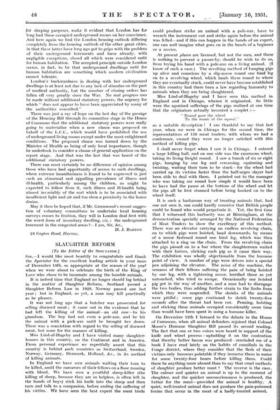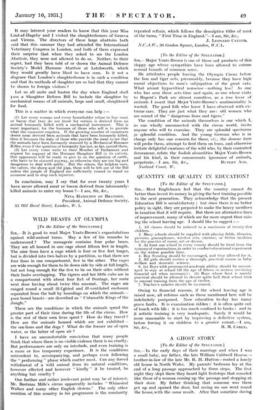SLAUGHTER REFORM
[To the Editor of the SPECTATOR] Sin,—I would like most heartily to congratulate and thank the Spectator for the excellent leading article in your issue of December 13th, so appropriate at the season of the year when we were about to celebrate the birth of the King of Love who chose to be incarnate among the humble animals.
It is indeed time that England no longer should lag behind in the matter of Slaughter Reform. Scotland passed a Slaughter Reform Law in 1929, Norway passed one last year ; but in England, as yet, a man may kill practically as -he pleases.
It was not long ago that a butcher was prosecuted for selling diseased meat ; it came out in the evidence that he had left the killing of the animal—an old cow—to his grandson. The boy had not even a pole-axe, and he hit the animal with a pick-axe until he brought her down. There was a conviction with regard to the selling of diseased meat, but none for the manner of killing.
Miss Lind-af-Hageby and I have visited many slaughter- houses in this country, on the Continent and in America. From personal experience we regretfully assert that this country is behind such countries as Switzerland, Sweden, Norway, Germany, Denmark, Holland, &c., in its method of killing animals.
In England we have seen animals waiting their turn to be killed, amid the carcasses of their fellows on a floor running
with blood. We have seen a youthful sheep-killer (the killing of sheep, because they are so helpless, is often left in the hands of boys) stick his knife into the sheep and then turn and talk to a companion, before ending the suffering of his victim. We have seen the best expert the meat trade
could produce strike an animal with a pole-axe, have to wrench the instrument out and strike again before the animal was felled—and if this can happen in the hands of an expert, one can well imagine what goes on in the hands of a -beginner or a novice.
At present places are licensed, but not the men, and there is nothing to prevent a passer-by, should he wish to do so, from trying his hand with a pole-axe on a living animal.. (I know of such a case.) The revolting method of hanging pigs up alive and conscious by a slip-noose round one hind leg on to a revolving wheel, which hauls them round to where they are eventually stuck, could never have become established in this country had there been a law regarding humanity to animals when they are being slaughtered.
Miss Lind-af-Hageby and I have seen this method in England and in Chicago, whence it originated. So little were the agonized sufferings of the pigs realized at one time that the originators actually invented a couplet :-
"Round goes the wheel
To the music of the squeal."
as a suitable description ! I am thankful to say that last year, when we were in Chicago for the second time, the representatives of 150 meat traders, with whom we had a 'conference, *owned they were no longer satisfied with this method. of killing pigs.
I shall never forget when I saw it in Chicago. I entered a large killing hall, and on one side was the enormous wheel, taking its living freight round. I saw a bunch of six or eight pigs, hanging by one leg and screaming, squirming and twisting, waiting their turn to be stuck—for the wheel had carried up its victims- faster than the half-negro slayer had been able to deal with them. I pointed out to the manager who was taking me round- how simple it would have been to have had the pause at the bottom of the wheel and -let the pigs all be first stunned before being hooked on to the wheel itself.
It is such a barbarous way of treating animals that, had one not seen it, one could hardly conceive that British people could be found who would perpetrate it. Yet, the first time that I witnessed this barbarity was at Birmingham, at the demonstration specially arranged by the National Federation of Meat Traders to show the excellency of this method. There was an elevator carrying an endless revolving chain, on to which pigs were hoisted, head downwards, by means of a noose fastened round one hind leg, Which was then attached to a ring on the chain. From the revolving chain the pigs pissed on to a bar where the slaughtermen waited With their knives, sticking each pig as it came their way. The exhibition was wholly objectionable from the humane point of view. A number of pigs were driven into a special pen adjoining the elevator. The noise of the machine, the screams of their fellows suffering the pain of being hoisted by one leg, with a tightening noose, terrified those as yet untouched, who tried to escape. Occasionally one hoisted pig "got in the way of another, and a man had to disengage the two bodies, thus adding further strain to the limbs from which they were suspended. The shrieks of the aninials were pitiful ; some pigs continued to shriek twenty-five seconds after the throat had been cut. Penning, hoisting and sticking these animals occupied considerably more time than would have been spent in using a humane killer. -
On December 12th I listened to the debate in the House of Commons, when all animal defenders rejoiced that Colonel Moore's Humane Slaughter 'Bill passed its second reading. The fact that one or two voices were heard in 'support of the knife and- wheel processupholding ' it on the contention that thereby better bacon was produced—reminded me of a book I have read lately on the habits of cannibals in the Congo district, where they consider that the flesh of their victims only becomes palatable if they immerse them in water for some twenty-four hours before killing them. Could there be anything more absurd than to say that cruel methods of slaughter produce better meat ? The reverse is the case. The calmer and quieter an animal is up to the moment of slaughter, and the quicker unconsciousness is produced, the better for the -meat—provided the animal is healthy. - A quiet, well-treated animal does- not produce the pain-poisoned toxins that occur in the meat of a badly-treated animal.
It may interest your readers to know that this year Miss Lind-af-Hageby and I visited the slaughterhouses of Geneva and Vienna. The „directors of these large abattoirs both said that this summer they had attended the International Veterinary Congress in London, and both of them expressed their surprise that when they asked to see the London Abattoir, they were not allowed to do so. Neither, to their regret, had they been told of or shown the Animal Defence Society's Model , Humane Abattoir at Letchworth, which they would greatly have liked to have seen. Is it not a disgrace that London's slaughterhouse is in such a condition and that its methods of slaughter are so bad that they cannot be shown to foreign visitors ?
Let us all unite and hasten the day when England shall pass a Slaughter Reform Bill to include the slaughter by mechanical means of all animals, large and small, slaughtered for food.
This is a matter in which everyone can help :-
(1) Let every woman and every householder refuse to buy meat or bacon that they do not know for certain is derived from an animal humanely killed with a mechanical instrument. This is most important, for the business of those who sell is to provide what the consumer requires. If the growing number of consumers desire meat derived from animals that have been humanely killed, then it becomes the duty of those who provide the meat to see that the animals have been humanely stunned by a Mechanical Huinane Killer, even if the question of humanity has not, so far, moved them.
(2) Let every voter write to their Member of Parliament and request his support of the Humane Slaughter Bill in its entirety. Our opponents will be ready to give in on the question of cattle, who have to be stunned anyway, as othetivise they are too big and dangerous to deal with safely. But the others, the helpless ones, the calves, the sheep and the pigs, these will be left out of the Bill unless the people of England are sufficiently roused to stand no nonsense and to stop such injustice.
In conclusion, may I say that for over twenty years I have never allowed meat or bacon derived from inhumanely- killed animals to enter my house ?—I am, Sir, &c.,
NINA HAMILTON OF BRANDON.



































 Previous page
Previous page